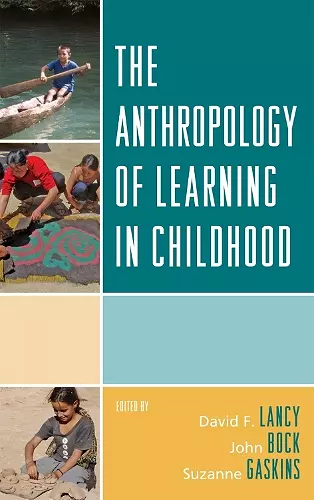The Anthropology of Learning in Childhood
John Bock editor David F Lancy editor Suzanne Gaskins editor
Format:Hardback
Publisher:AltaMira Press
Published:16th Jan '10
Currently unavailable, and unfortunately no date known when it will be back
This hardback is available in another edition too:
- Paperback£51.00was £51.00(9780759113237)

The Anthropology of Learning in Childhood offers a large, mural-like portrait of childhood across time, culture, species, and environment. Even a casual reading of the literature on childhood will persuade one that learning is a very important topic that commands the attention of tens of thousands of scholars and practitioners. Yet, anthropological research on children has exerted relatively little influence on this community. This book will change that. The book demonstrates that anthropologists studying childhood can offer a description and theoretically sophisticated account of children's learning and its role in their development, socialization, and enculturation. Further, it demonstrates the particular contribution that children's learning makes to the construction of society and culture as well as the role that culture-acquiring children play in human evolution. Chapters have been contributed in archaeology, primatology, biological and cultural anthropology, and cross-cultural psychology.
David Lancy, John Bock, and Suzanne Gaskins have assembled an outstanding set of essays on what children around the world learn, how they learn it, and the many people involved in that learning. This book will be a valuable resource for students, researchers, educators, and all those interested in a broader cross-cultural perspective on these critical issues for understanding children and childhood. -- Jill E. Korbin, Case Western Reserve University
This reference volume is a unique contribution to childhood studies. The eminent contributors present the full breadth of anthropological knowledge about children's learning, from historical and cross-cultural studies to evolutionary biology and life-history theory. By leaving out no perspective or condition, the volume presents a synthesis of what anthropologists know about childhood learning. There is something for everyone here—students, teachers, and researchers alike. Nothing like this book currently exists, and it is unlikely to be matched for many years. -- Jane B. Lancaster, University of New Mexico
The Anthropology of Learning in Childhood shows us how and why we acquire knowledge and understanding of the world. The authors provide excellent overviews of evolutionary perspectives, social processes in learning, the roles of play and work, non-parental teachers, classrooms, and the importance of moral, sociolinguistic, and gender frameworks. The time and context ranges from non-human primates and the Paleolithic, right up to the present. This is a marvelously holistic, landmark book - one of the best books on learning in sociocultural contexts currently available. -- Thomas S. Weisner, University of California, Los Angeles
A fascinating collection of anthropological accounts of children's learning in context. From archaeology to evolutionary biology, from primate routines to identity construction, from pottery-making to street crime, this book brings to light the mundane and the extraordinary in children's experiences of learning culture across time and space. It challenges the reader to focus on the real conditions of contemporary children's lives. -- Margaret Eisenhart, Distinguished Professor Emerita, University of Colorado-Boulder
The anthropologists who contributed to this book have conducted fieldwork in many parts of the world and have documented, in depth, the manner and contexts in which children learn. Their research has enabled them to create some generalisations about the conditions and processes of human learning, but they have also revealed unexpected variations in the learning process that have resulted from human adaptations to unpredictable conditions. The Anthropology of Learning in Childhood was largely intended for anthropologists, and students of anthropology, but archaeologists will also find much in the volume to interest them. * South African Archaeological Bulletin *
David Lancy, John Bock, and Suzanne Gaskins make an important contribution to our understanding of children’s learning through a unique collection of eighteen essays written by archaeologists, cultural anthropologists, evolutionary anthropologist, and linguist. This volume is noteworthy for its comprehensiveness including chapters examining the archaeological record, nonhuman primates, traditional societies, and children’s learning in adverse environments….As Lancy, Bock, and Gaskins’s book reflects, this scholarship has resulted in a fundamental reformulation of learning including its evolutionary significance, what children learn, and how learning takes place in diverse contexts. * American Journal of Play *
ISBN: 9780759113220
Dimensions: 240mm x 163mm x 34mm
Weight: 898g
410 pages